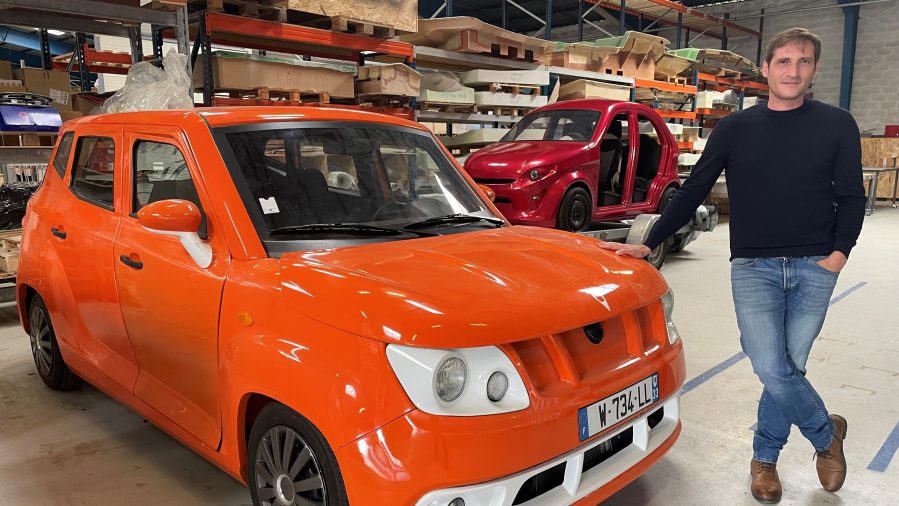French company hopes its low-tech, easily assembled EV will revolutionize carmaking

French carmaker Renault had a surprise success in the early 2000s, when a low-cost car it designed for developing countries, the Logan, was a hit with low-income people in France. That car is still a strong brand for Renault almost two decades later. The company boasts that a new Logan costs as much as a used car from other manufacturers.
Now, a former Renault designer is developing a new car, the Gazelle, that’s even more radical: an electric vehicle that’s not just low-cost to produce and purchase, but it’s also pretty easy to assemble. In the Bordeaux region of France, freelance reporter John Laurenson took a ride in this low-tech car.
I am climbing into a prototype of the Gazelle, a low-tech family car, with its designer, Gael Lavaud. “We want to be really in the dynamics of intentional simplicity,” Lavaud said.
Intentional simplicity. So it’s super basic and made of fiberglass, extremely light. “It’s only 900 kilos [about 1984 pounds], compared to a standard car, so it’s not twice lighter, but almost,” he added. “And this is very important because the lighter you are, the less consumption you will have, because three-quarters of the consumption is about the weight.”
Lavaud said the Gazelle consumes about 40% less electricity per mile than an equivalent electric car, so it can have a smaller battery. One prototype has a solar panel roof that provides enough energy for 25 miles per day. Lavaud expects safety authorities to approve the Gazelle this year and for production to start in 2024 with a retail price of about $20,000.
Nicolas Meilhan, an independent energy and mobility consultant, said the success of the Gazelle will depend on the evolution of energy and metal prices, and government incentives to buy green.
“We see that the price of battery will increase for the first time this year. So people are realizing that maybe the electric tank with 60 or 80 kilowatt-hour battery is not the solution,” Meilhan said. “And this is where maybe the regulation should encourage lighter cars.”
We arrived at Lavaud’s Gazelle Tech micro-factory near Bordeaux. The Gazelle inventors hope it will revolutionize the way we make cars. The Gazelle chassis is so simple, it only has 10 parts. You can bang it together like Lego bricks in a factory that’s made out of a few shipping containers.
“It’s only four containers with some tools, but really small tools, and with some compressed air, and that’s it. And you can assemble cars,” Lavaud said.
The total cost of a Gazelle micro-factory is $300,000. These cheap, mobile factories could, Lavaud said, bring car manufacturing to rural areas and developing countries.
Related links: More insight from Kimberly Adams
Here’s a link to a 2006 story from Automotive News Europe about the surprise success of the Logan car in Europe, shortly after it launched. And here are more details about Renault’s modern iteration of the Logan.
This story got us thinking about other types of low-tech solutions, and it turns out there’s a website, coincidentally out of Europe, focusing on just that — Low-Tech Magazine. One fun article in the mix is called “The Revenge of the Hot Water Bottle.”
The future of this podcast starts with you.
Every day, the “Marketplace Tech” team demystifies the digital economy with stories that explore more than just Big Tech. We’re committed to covering topics that matter to you and the world around us, diving deep into how technology intersects with climate change, inequity, and disinformation.
As part of a nonprofit newsroom, we’re counting on listeners like you to keep this public service paywall-free and available to all.
Support “Marketplace Tech” in any amount today and become a partner in our mission.


















